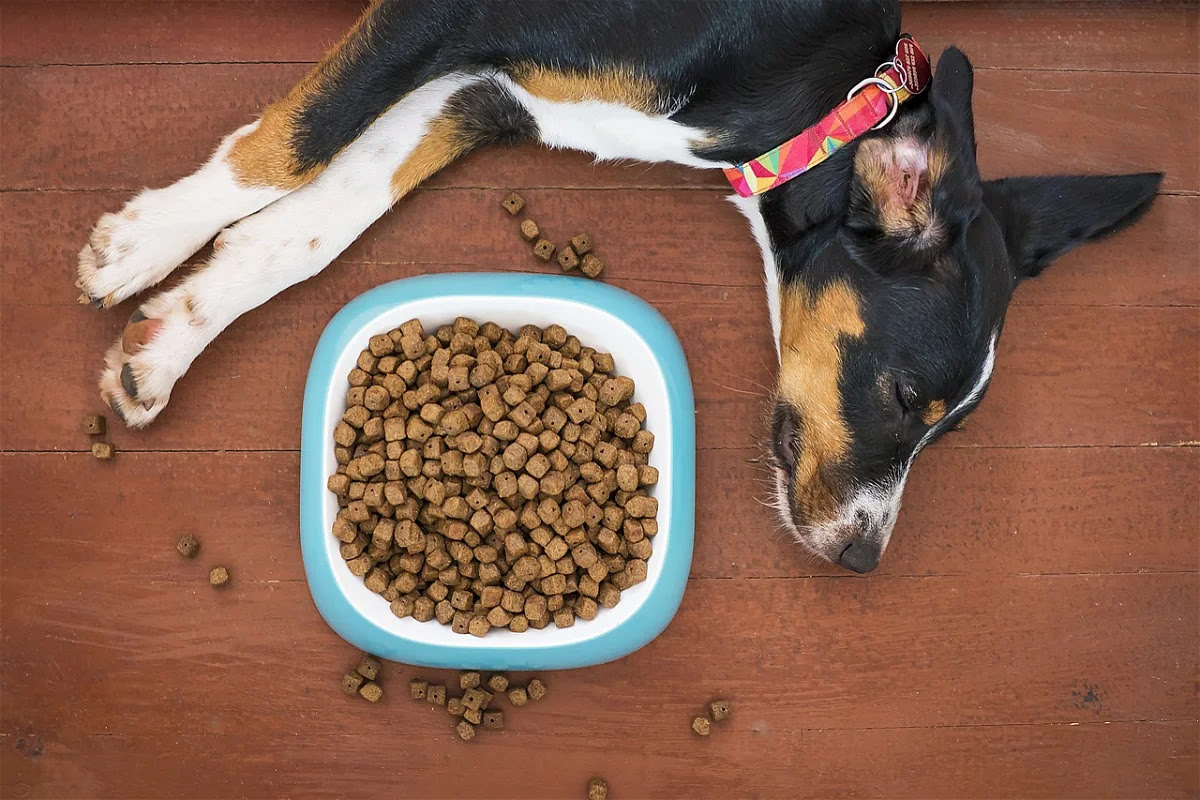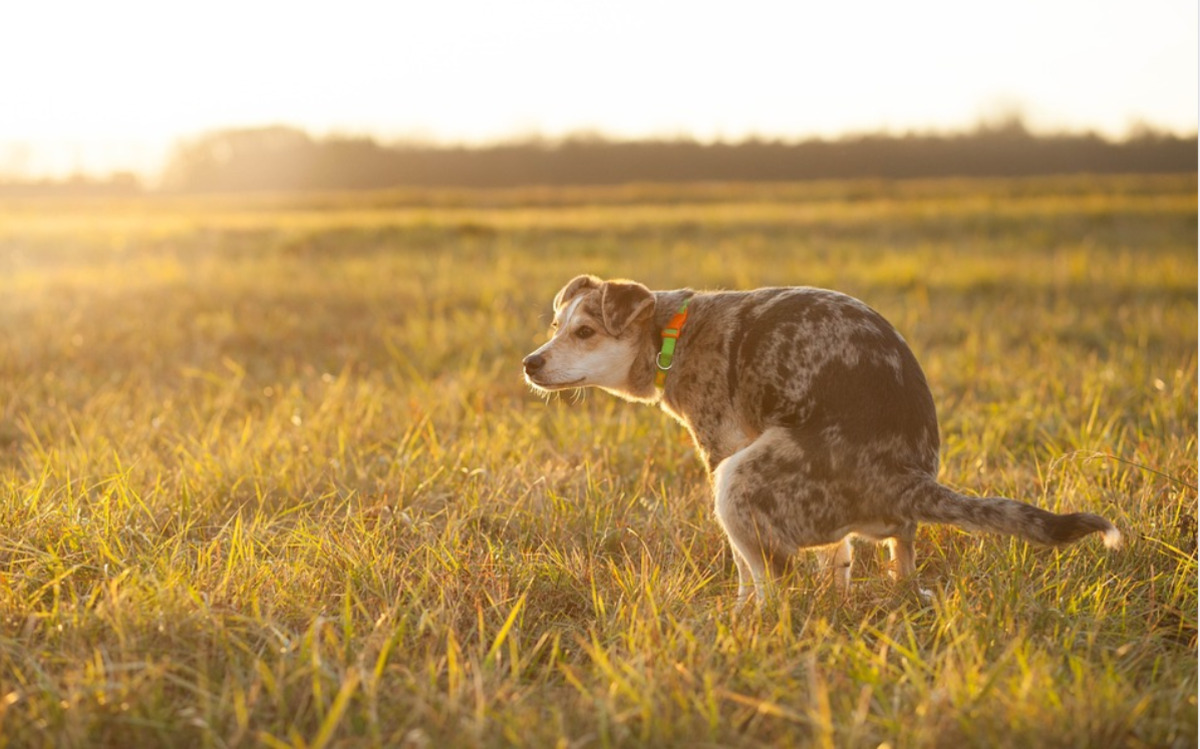Home>Health & Wellness>Nutrition & Diet>What Kind Of Diet Helps My Dog’s Itchy Skin


Nutrition & Diet
What Kind Of Diet Helps My Dog’s Itchy Skin
Published: January 28, 2024
Discover the best nutrition and diet for your dog's itchy skin. Learn how to alleviate discomfort and promote a healthy coat with the right dietary choices.
(Many of the links in this article redirect to a specific reviewed product. Your purchase of these products through affiliate links helps to generate commission for Pawsomeoldies.com, at no extra cost. Learn more)
Table of Contents
Introduction
Dogs are cherished members of our families, and as pet owners, we strive to provide them with the best care possible. One common issue that many dog owners encounter is their furry friend's itchy skin. Itchy skin can be a source of discomfort for dogs, leading to incessant scratching, licking, and even hair loss. While there can be various causes for itchy skin in dogs, including allergies, parasites, and skin infections, the role of diet in managing this condition should not be overlooked.
Understanding the impact of diet on a dog's skin health is crucial for pet owners seeking to alleviate their beloved companion's discomfort. By recognizing the significance of proper nutrition and its influence on a dog's skin, pet owners can take proactive steps to address their pet's itchy skin and promote overall well-being. In the following sections, we will delve into the essential nutrients for healthy skin, foods to include in your dog's diet, foods to avoid, and additional tips for managing your dog's itchy skin through diet. Through this comprehensive exploration, you will gain valuable insights into how dietary choices can play a pivotal role in supporting your dog's skin health and overall vitality.
Understanding the Causes of Itchy Skin in Dogs
Itchy skin, also known as pruritus, is a prevalent issue among dogs and can manifest in various forms, including scratching, biting, and rubbing against surfaces. Understanding the underlying causes of itchy skin in dogs is essential for effective management and treatment. There are several factors that can contribute to this discomforting condition:
-
Allergies: Dogs can develop allergies to a wide range of environmental factors, such as pollen, dust mites, mold, and certain foods. These allergies can trigger skin irritation and itching, leading to a cycle of discomfort for the affected pet.
-
Parasites: Infestations of fleas, ticks, and mites are common culprits of itchy skin in dogs. These parasites not only cause direct irritation but can also transmit diseases that exacerbate the itching and discomfort.
-
Skin Infections: Bacterial or fungal infections can lead to itchy skin in dogs. These infections may result from underlying health conditions, environmental factors, or inadequate grooming practices.
-
Dry Skin: Just like humans, dogs can experience dry skin, especially in arid climates or during the winter months. Dry skin can lead to itching and flakiness, causing discomfort for the dog.
-
Dietary Factors: In some cases, a dog's diet can contribute to itchy skin. Certain food ingredients or nutrient deficiencies can impact the health of the skin, leading to irritation and itching.
-
Underlying Health Conditions: Itchy skin can also be a symptom of underlying health issues such as hormonal imbalances, autoimmune disorders, or metabolic abnormalities. Identifying and addressing these conditions is crucial for managing the dog's skin health.
Understanding these potential causes of itchy skin in dogs is the first step in addressing the issue effectively. By recognizing the specific factors contributing to a dog's discomfort, pet owners can take targeted measures to alleviate the itching and promote overall skin health. Identifying the root cause of the itching, whether it be allergies, parasites, infections, dry skin, dietary factors, or underlying health conditions, enables pet owners to tailor their approach to managing their dog's skin issues, leading to a happier, more comfortable pet.
The Role of Diet in Managing Itchy Skin
The role of diet in managing a dog's itchy skin is a crucial aspect of holistic skin care. Just as a balanced diet is essential for human skin health, the nutrients and ingredients in a dog's diet play a significant role in maintaining healthy skin and addressing skin issues. The skin is the body's largest organ and serves as a protective barrier against environmental stressors, making it vital to support its health through proper nutrition.
Dietary factors can directly impact a dog's skin condition, contributing to either the alleviation or exacerbation of itchy skin. Certain nutrients, such as essential fatty acids, vitamins, and minerals, play key roles in promoting skin health and addressing inflammatory skin conditions. Additionally, the presence of allergens or irritants in a dog's diet can trigger allergic reactions, leading to skin irritation and itching.
By carefully selecting and formulating a dog's diet, pet owners can actively manage their pet's itchy skin and promote overall skin health. This involves choosing high-quality, balanced dog food that provides essential nutrients to support skin function and repair. Furthermore, identifying and eliminating potential dietary triggers, such as common allergens or additives, can help alleviate skin irritation and reduce itching.
In cases where a dog's itchy skin is linked to specific dietary sensitivities or deficiencies, targeted dietary modifications can yield significant improvements. For example, incorporating hypoallergenic or limited ingredient diets can be beneficial for dogs with food sensitivities, as these formulations minimize potential allergens and support skin health. Similarly, ensuring adequate intake of omega-3 fatty acids, commonly found in fish oil supplements, can help reduce inflammation and enhance skin barrier function.
Overall, the role of diet in managing a dog's itchy skin extends beyond mere sustenance; it serves as a fundamental component of proactive skin care and wellness. By understanding the impact of dietary choices on a dog's skin health and making informed decisions regarding their diet, pet owners can effectively contribute to the alleviation of itchy skin and the promotion of overall well-being for their beloved canine companions.
Essential Nutrients for Healthy Skin
Proper nutrition plays a pivotal role in maintaining healthy skin for dogs, and ensuring the intake of essential nutrients is fundamental to supporting skin health and addressing issues such as itchy skin. Several key nutrients are particularly beneficial in promoting healthy skin function and addressing skin conditions in dogs.
Omega-3 Fatty Acids
Omega-3 fatty acids, including eicosapentaenoic acid (EPA) and docosahexaenoic acid (DHA), are renowned for their anti-inflammatory properties and their ability to support skin health. These essential fatty acids play a crucial role in modulating the inflammatory response within the skin, thereby reducing itching and irritation. Additionally, omega-3 fatty acids contribute to the maintenance of a healthy skin barrier, which is essential for protecting against environmental stressors and preventing moisture loss.
Omega-6 Fatty Acids
Alongside omega-3 fatty acids, omega-6 fatty acids, such as linoleic acid, are vital for skin health in dogs. These fatty acids are integral components of the skin's lipid barrier, contributing to moisture retention and overall skin integrity. By incorporating omega-6 fatty acids into a dog's diet, pet owners can support the maintenance of supple, healthy skin and reduce the risk of dryness and itching.
Vitamin E
Vitamin E is a potent antioxidant that plays a crucial role in protecting the skin from oxidative damage. By neutralizing free radicals and reducing oxidative stress, vitamin E helps maintain skin health and supports the repair of damaged skin cells. Additionally, vitamin E contributes to the overall immune function, which is essential for addressing skin infections and inflammatory conditions.
Zinc
Zinc is an essential mineral that is involved in numerous cellular processes, including skin repair and regeneration. Adequate zinc levels are crucial for maintaining healthy skin, as this mineral supports the synthesis of collagen and promotes wound healing. Furthermore, zinc possesses anti-inflammatory properties, which can help alleviate itching and discomfort associated with skin conditions.
Protein
Protein is a foundational nutrient for skin health, as it provides the building blocks necessary for tissue repair and regeneration. High-quality protein sources, such as lean meats and fish, supply essential amino acids that are integral to skin structure and function. By ensuring adequate protein intake, pet owners can support the maintenance of healthy skin and contribute to the alleviation of skin issues.
Incorporating these essential nutrients into a dog's diet is instrumental in promoting healthy skin and addressing itchy skin. Whether through carefully selected commercial dog foods or targeted nutritional supplements, providing the necessary building blocks for skin health can significantly contribute to the overall well-being of dogs, ensuring they enjoy comfortable, itch-free skin and a vibrant, healthy coat.
Foods to Include in Your Dog's Diet
When it comes to promoting healthy skin and addressing itchy skin in dogs, the inclusion of specific foods in their diet can make a substantial difference. By incorporating nutrient-rich and skin-supportive ingredients, pet owners can proactively contribute to their dog's skin health and overall well-being. Here are some beneficial foods to consider including in your dog's diet:
Lean Proteins
High-quality, lean proteins such as chicken, turkey, fish, and lean cuts of beef serve as essential building blocks for healthy skin. These protein sources provide amino acids necessary for skin repair and regeneration, supporting the maintenance of a strong and resilient skin barrier.
Omega-3 Rich Foods
Incorporating omega-3 rich foods such as salmon, sardines, and flaxseeds can significantly benefit a dog's skin health. These foods are abundant in EPA and DHA, essential fatty acids known for their anti-inflammatory properties and their role in promoting a healthy skin barrier. Including these sources of omega-3 fatty acids in your dog's diet can help reduce skin inflammation and alleviate itching.
Fruits and Vegetables
Certain fruits and vegetables, such as blueberries, sweet potatoes, and spinach, offer valuable antioxidants and essential nutrients that support skin health. Antioxidants help combat oxidative stress and free radical damage, contributing to the overall health and vitality of the skin. Additionally, the vitamins and minerals present in fruits and vegetables play a role in skin repair and immune function.
Read more: What Dog Diet Helps Stop Pancreatitis
Probiotic-Rich Foods
Incorporating probiotic-rich foods, including yogurt and kefir, can benefit a dog's skin health by supporting a healthy gut microbiome. A balanced gut microbiome is linked to improved skin health and immune function, potentially reducing the risk of allergic skin conditions and promoting a healthy coat.
Eggs
Eggs are a nutrient-dense food that can contribute to a dog's skin health due to their high-quality protein content and the presence of biotin. Biotin, a B-vitamin, is essential for skin and coat health, and its inclusion in the diet can help maintain healthy skin and reduce the risk of dryness and itching.
By incorporating these skin-supportive foods into your dog's diet, you can actively contribute to the promotion of healthy skin and the alleviation of itchy skin. Additionally, ensuring a balanced and varied diet that includes these beneficial foods can enhance your dog's overall nutritional intake, supporting their vitality and comfort.
Foods to Avoid in Your Dog's Diet
While it's essential to focus on incorporating beneficial foods into your dog's diet, it's equally important to be mindful of the items that should be avoided to promote optimal skin health and alleviate itchy skin. Certain foods and ingredients have the potential to exacerbate skin issues and contribute to discomfort for dogs. By being aware of these items and making informed dietary choices, pet owners can proactively support their dog's well-being. Here are some foods to avoid in your dog's diet:
Processed Foods
Processed foods, including commercial dog treats high in artificial additives, preservatives, and fillers, can have a negative impact on a dog's skin health. These ingredients have the potential to trigger allergic reactions and skin irritation, leading to itching and discomfort. Opting for natural, minimally processed treats and snacks can help mitigate the risk of skin issues associated with artificial additives.
Grains with High Gluten Content
Certain grains, particularly those with high gluten content such as wheat, can be problematic for dogs with gluten sensitivities or allergies. Gluten intolerance can manifest as skin issues, including itching and inflammation. Avoiding grains with high gluten content and opting for alternative carbohydrate sources, such as rice or oats, can be beneficial for dogs prone to skin sensitivities.
High-Glycemic Carbohydrates
High-glycemic carbohydrates, such as white potatoes and refined grains, can contribute to fluctuations in blood sugar levels and potentially exacerbate inflammatory skin conditions. These carbohydrates have the potential to promote systemic inflammation, which can manifest as skin irritation and itching. Choosing low-glycemic carbohydrate sources, such as sweet potatoes or legumes, can help maintain more stable blood sugar levels and support skin health.
Foods with Artificial Additives
Artificial additives, including artificial colors, flavors, and preservatives, can be detrimental to a dog's skin health. These additives have the potential to trigger allergic reactions and contribute to skin irritation and itching. Opting for natural, whole food-based options and avoiding products with excessive artificial additives can help minimize the risk of skin issues related to these compounds.
Common Allergens
Identifying and avoiding common food allergens for dogs, such as soy, corn, and dairy products, is crucial for managing itchy skin. These allergens have the potential to induce allergic reactions that manifest as skin issues, including itching, redness, and inflammation. By steering clear of known allergens and opting for hypoallergenic dietary options, pet owners can help reduce the risk of allergic skin reactions in their dogs.
By being mindful of the foods to avoid in your dog's diet and making informed choices regarding their nutrition, pet owners can play a proactive role in supporting their dog's skin health and overall well-being. Through thoughtful dietary management, it's possible to minimize the risk of itchy skin and promote a comfortable, vibrant coat for our beloved canine companions.
Additional Tips for Managing Your Dog's Itchy Skin Through Diet
In addition to selecting the right foods and nutrients for your dog's diet, there are several supplementary measures that can further contribute to managing your dog's itchy skin through dietary interventions. These additional tips encompass various aspects of dietary management and holistic skin care, aiming to provide comprehensive support for your dog's skin health.
-
Hydration: Ensuring adequate hydration is essential for maintaining healthy skin. Encourage your dog to drink plenty of water, as proper hydration supports skin elasticity and overall skin function. Additionally, moist, well-hydrated skin is less prone to dryness and itching, contributing to your dog's comfort.
-
Regular Grooming: Regular grooming practices, including brushing and bathing, play a crucial role in skin health. Brushing helps distribute natural oils throughout the coat, promoting skin hydration and reducing the risk of dry, itchy skin. When bathing your dog, opt for gentle, moisturizing shampoos that support skin barrier function and minimize irritation.
-
Environmental Considerations: Environmental factors can impact your dog's skin health. Providing a comfortable, stress-free environment and minimizing exposure to potential skin irritants, such as harsh chemicals and allergens, can help reduce the risk of skin issues. Additionally, ensuring your dog has a clean, comfortable resting area can contribute to their overall well-being.
-
Consultation with a Veterinarian: If your dog experiences persistent or severe itching, consulting with a veterinarian is crucial. A veterinarian can conduct thorough assessments to identify underlying causes of the itching and provide tailored dietary recommendations or potential medical interventions. Professional guidance ensures that your dog's specific needs are addressed effectively.
-
Gradual Dietary Changes: When implementing dietary modifications for your dog, it's important to introduce changes gradually. Abrupt dietary shifts can potentially disrupt your dog's digestive system and lead to gastrointestinal issues. By gradually transitioning to a new diet or incorporating specific supplements, you can minimize the risk of digestive disturbances and support your dog's overall well-being.
-
Monitoring and Adaptation: Observing your dog's response to dietary changes is essential for effective management of itchy skin. Monitor your dog's skin condition, coat quality, and overall comfort, and be prepared to adapt the diet as needed. By staying attentive to your dog's individual needs and responses, you can refine their dietary regimen to best support their skin health.
By integrating these additional tips into your approach to managing your dog's itchy skin through diet, you can create a comprehensive and supportive framework for promoting skin health and alleviating discomfort. Through a holistic combination of dietary considerations, grooming practices, environmental management, and professional guidance, you can contribute to your dog's overall well-being and help them enjoy a comfortable, itch-free life.
Conclusion
In conclusion, the management of a dog's itchy skin through dietary interventions holds significant promise for promoting skin health and overall well-being. By recognizing the intricate relationship between nutrition and skin function, pet owners can proactively address their dog's itching and discomfort through informed dietary choices and holistic care practices.
Understanding the multifaceted nature of itchy skin in dogs, including potential causes such as allergies, parasites, skin infections, dryness, dietary factors, and underlying health conditions, provides a foundation for tailored dietary management. By identifying specific dietary triggers and deficiencies that may contribute to itchy skin, pet owners can take targeted steps to alleviate their dog's discomfort and support their skin health.
Essential nutrients, including omega-3 and omega-6 fatty acids, vitamin E, zinc, and high-quality proteins, play pivotal roles in promoting healthy skin function and addressing inflammatory skin conditions. By incorporating these nutrients into a dog's diet through carefully selected foods and supplements, pet owners can actively contribute to the alleviation of itchy skin and the maintenance of a vibrant, healthy coat.
Furthermore, the inclusion of beneficial foods, such as lean proteins, omega-3 rich sources, fruits, vegetables, and probiotic-rich options, can enhance a dog's nutritional intake and support their skin health. Conversely, being mindful of foods to avoid, such as processed items, high-gluten grains, high-glycemic carbohydrates, and artificial additives, can help minimize the risk of exacerbating skin issues.
Supplementary measures, including hydration, regular grooming, environmental considerations, veterinary consultation, gradual dietary changes, and attentive monitoring, complement dietary interventions to create a comprehensive approach to managing a dog's itchy skin. By integrating these additional tips into their care routine, pet owners can provide holistic support for their dog's skin health and overall comfort.
In essence, the role of diet in managing a dog's itchy skin extends beyond mere sustenance; it embodies a proactive and nurturing approach to promoting skin health and addressing discomfort. Through informed dietary choices, attentive care practices, and a deep understanding of their dog's individual needs, pet owners can significantly contribute to their beloved companion's well-being, allowing them to thrive with comfortable, itch-free skin and a radiant coat.










